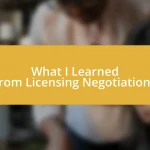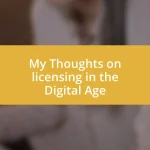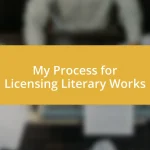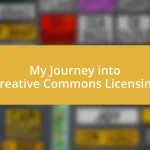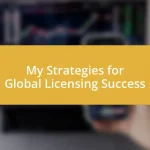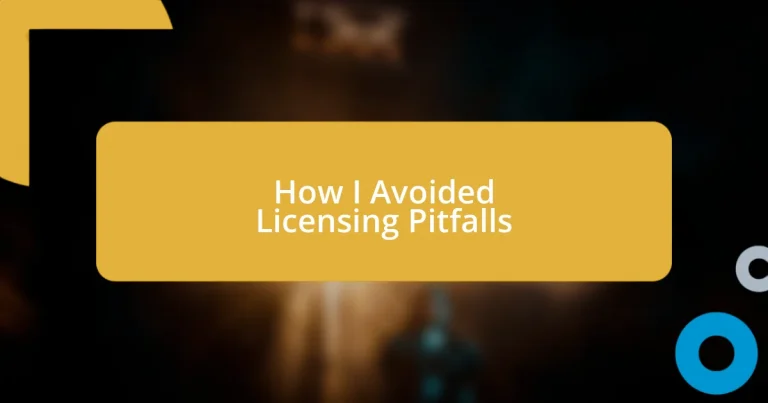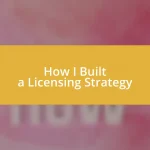Key takeaways:
- Understanding and clarifying licensing agreements is crucial to avoid costly misunderstandings and limitations on creative work.
- Consulting legal experts can uncover potential pitfalls in agreements that may not be obvious, reinforcing the importance of seeking professional guidance.
- Maintaining compliance with licensing terms through checklists and regular reviews helps prevent breaches and adapt to regulatory changes.
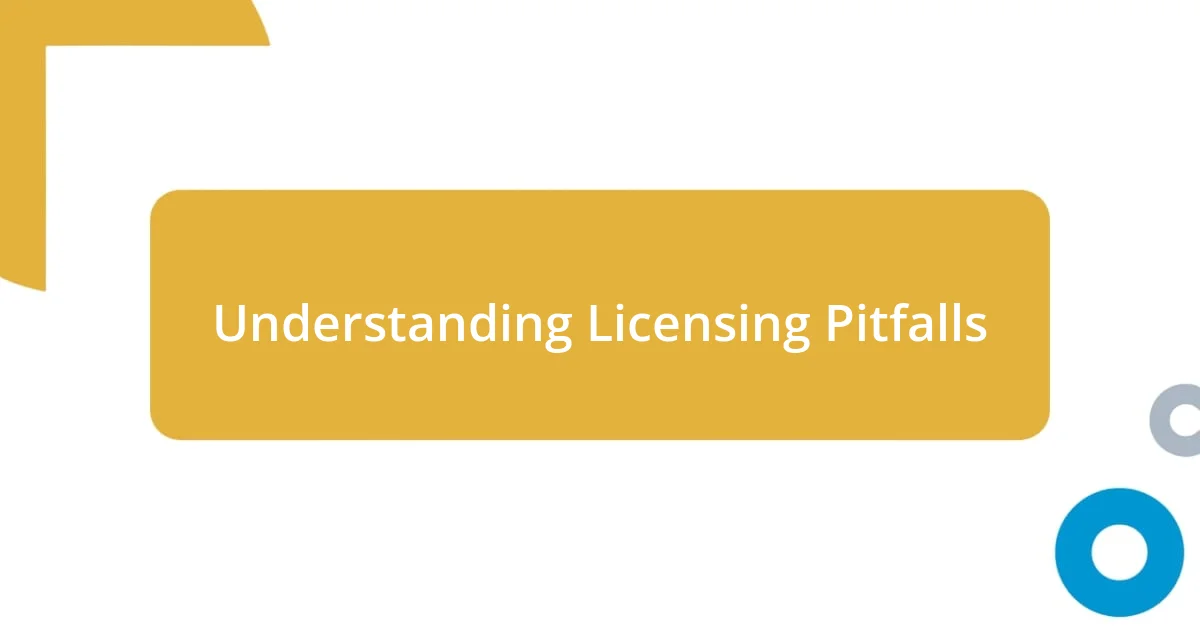
Understanding Licensing Pitfalls
Licensing pitfalls can often feel like hidden traps, waiting to ensnare the unsuspecting. I remember a time when I naively assumed that simply signing a contract meant I was protected. Have you ever overlooked the fine print in a deal? I learned the hard way that vague terms can lead to confusion and costly misunderstandings.
One of the most significant challenges in licensing is the lack of clarity in agreements. I once found myself in a situation where the scope of usage was far too narrow, leaving me unable to leverage my work as intended. It was a wake-up call—what good is a license if it restricts your creativity? These experiences underscore the importance of fully understanding what you’re agreeing to and ensuring that your rights are clearly defined.
Moreover, the emotional toll of these pitfalls can’t be underestimated. It’s frustrating to realize that a missed detail can lead to lost opportunities and money. Have you ever felt that sinking feeling of regret after making a hasty decision? I’ve had my share, but each mistake taught me to approach licensing with a critical eye and a clear strategy for avoiding those pitfalls in the future.
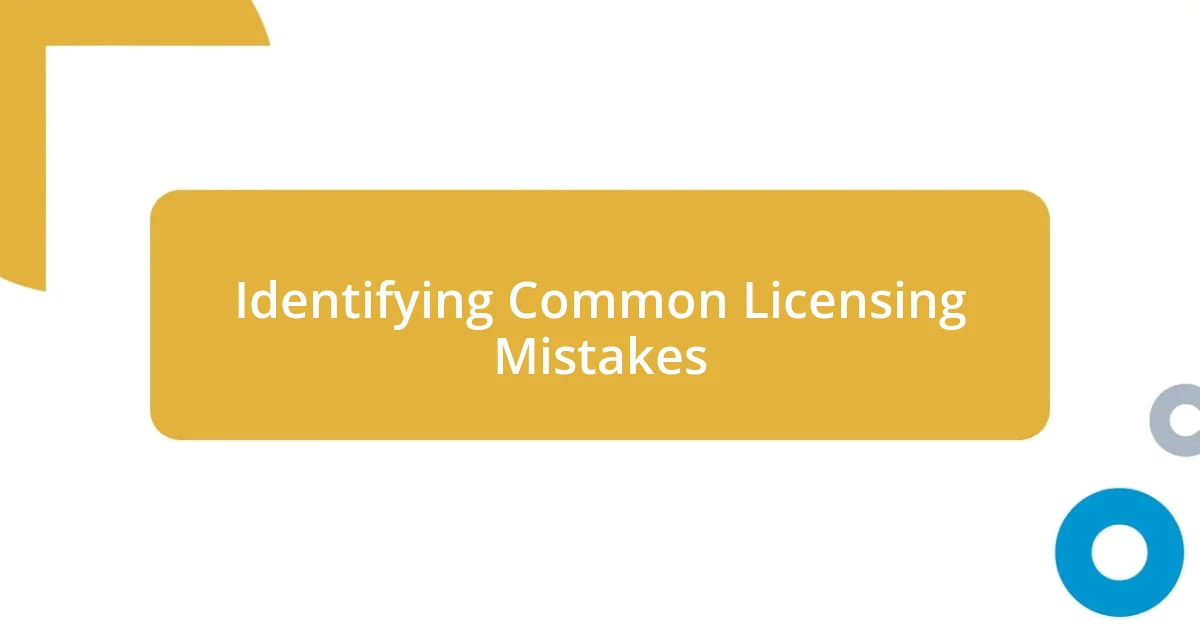
Identifying Common Licensing Mistakes
Identifying common licensing mistakes is crucial for success. I can’t stress enough how easy it is to misinterpret the terms of an agreement. I’ve been there—signing a contract without fully grasping the conditions, only to find myself restricted from using my work freely later on. This experience taught me to always seek clarity in every detail, especially the definitions of terms like “usage rights” and “territorial restrictions.” Having these clearly spelled out can save you a world of trouble.
Another common pitfall I’ve encountered is assuming that all licenses are created equal. I once faced a situation where I paid a premium for what I thought was an exclusive license, only to discover it didn’t cover all necessary distribution channels. It reminded me that not all agreements are straightforward, and it’s essential to evaluate the implications of each type of license. Have you found yourself in a similar situation? If so, you’re not alone. Many overlook these distinctions, which can lead to unintended limitations.
Finally, I’ve learned the importance of not rushing into agreements. The pressure to finalize a deal can cloud judgment. Once, after a heated negotiation, I hastily signed a license without consulting a legal expert, which led to a costly mistake down the road. This taught me to take my time and lean on trusted advisors. After all, being thorough is better than being sorry when it comes to licensing mistakes.
| Licensing Mistake | My Experience |
|---|---|
| Overlooking Fine Print | Signed a contract without understanding its terms, leading to restrictions on my work. |
| Assuming All Licenses Are Equal | Paid for an exclusive license, only to find it didn’t cover all distribution channels. |
| Rushing Agreements | Signed a deal without legal advice, resulting in unforeseen costs. |
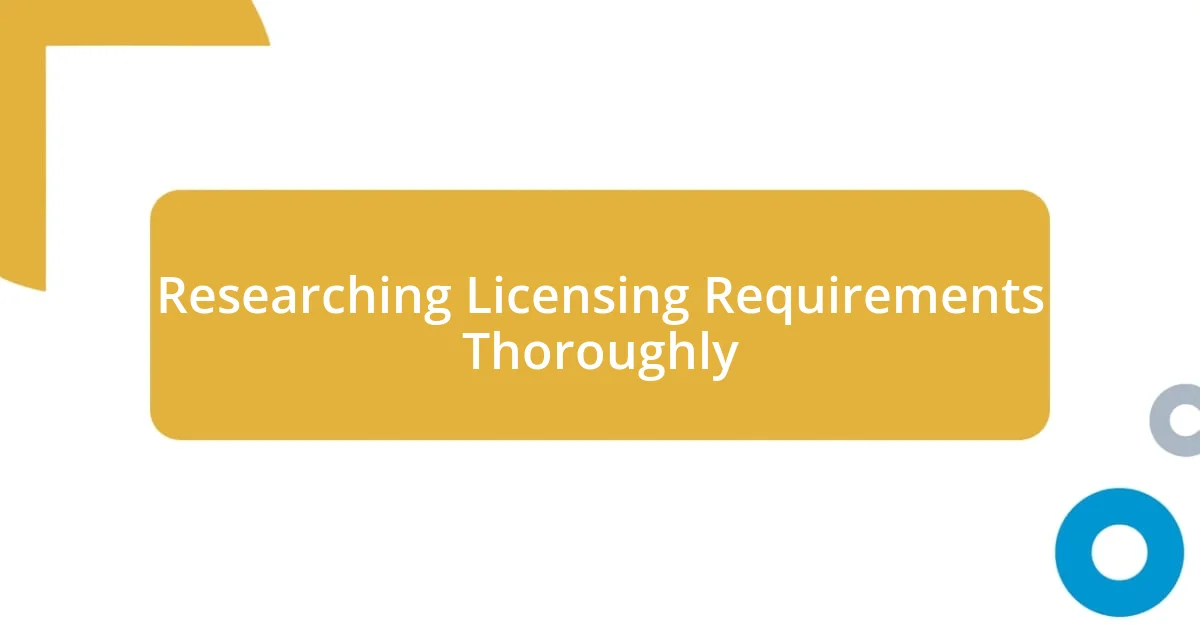
Researching Licensing Requirements Thoroughly
Researching licensing requirements thoroughly is something I’ve come to view as non-negotiable. I vividly remember a time when I skimmed through the regulations for a creative project and ended up unwittingly violating copyright laws. The anxiety that washed over me when I realized my mistake was intense. It made me appreciate just how vital it is to invest time in understanding the legal landscape surrounding licensing. I’ve since adopted a diligent approach to research, ensuring that I’m well-informed before signing any agreements.
To avoid similar pitfalls, here’s a checklist based on my experiences:
- Understand Local and National Laws: Licensing requirements can differ widely depending on your location. I learned this the hard way when I faced unexpected fees simply because I hadn’t checked local regulations.
- Investigate the Specifics of Each License: Before diving into an agreement, I now dissect the language to clarify what is and isn’t allowed. This became crucial when a misunderstood term almost cost me a major opportunity.
- Consult with Experts: I realized how important it is to have a network of legal advisors or experienced colleagues. Seeking their input can provide critical insights that I might overlook on my own.
Taking the time to dig deep into the details of licensing has not only saved me financial setbacks but has also provided peace of mind. I now feel empowered and ready to navigate the licensing landscape confidently.
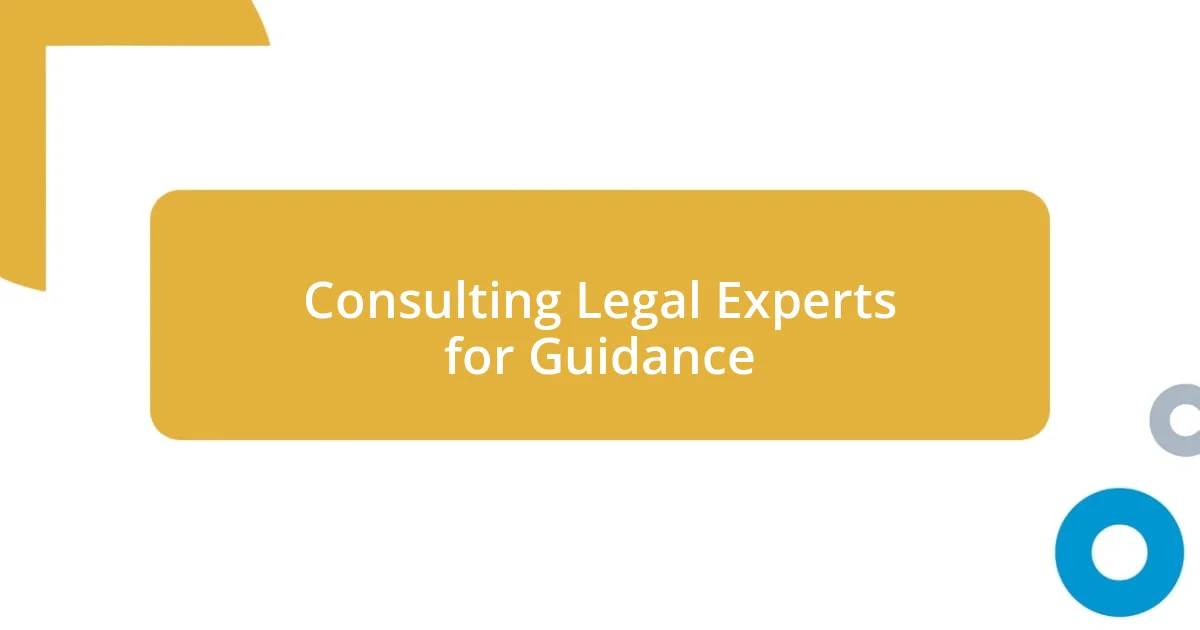
Consulting Legal Experts for Guidance
Consulting legal experts has been one of the smartest moves I’ve made in my licensing journey. I recall a specific instance when I was about to sign a licensing agreement for a collaboration that seemed promising. Just before finalizing the deal, I decided to consult an attorney specializing in entertainment law. They uncovered clauses that initially appeared harmless but would have severely limited my creative freedom. That moment made me realize how invaluable expert guidance can be.
There’s a sense of comfort that comes from having a legal professional in your corner. I often think back to when I was unsure about the implications of international licensing rights. My lawyer explained the nuances and risks in such agreements, which left me feeling much more confident about proceeding. When you’re venturing into unfamiliar territory, isn’t it refreshing to have someone knowledgeable guide you? It reinforces the idea that asking for help is actually a sign of strength, not weakness.
Ultimately, the cost of hiring a legal expert can be insignificant when weighed against the potential pitfalls of ignoring their advice. I once budgeted for a legal consultation instead of winging it, and that small investment saved me from signing a deal that would have restricted my work for years. Have you ever considered how a simple conversation with a legal expert could shift your perspective? It’s these moments of clarity that can truly change the course of your creative projects.
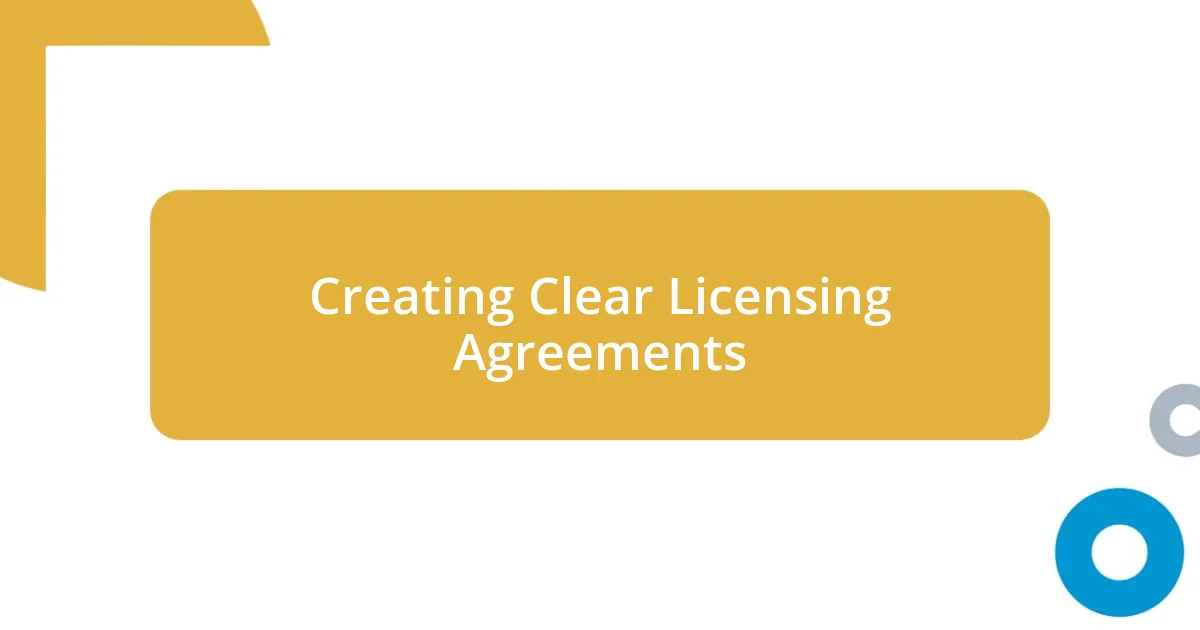
Creating Clear Licensing Agreements
Creating clear licensing agreements has been a pivotal part of my journey in the creative industry. I recall one licensing deal where the language was so convoluted that it felt like a maze. The more I read, the more confused I became. It hit me that clarity is essential. I started drafting agreements that left no room for ambiguity. Simple, straightforward language not only protects my interests but also builds trust with partners.
When crafting an agreement, I always take the time to define key terms explicitly. For instance, I learned to clarify what “exclusive rights” actually entailed in one project, which prevented a potential overlap with another client. It’s not just about legal jargon; it’s about ensuring everyone is on the same page. Don’t you think it’s easier to collaborate when there’s mutual understanding? I’ve found that taking this extra step makes discussions more productive and sets the stage for successful partnerships.
I also make it a point to include a clear outline of responsibilities and deliverables. Early in my career, a vague agreement left one party assuming they were responsible for marketing, while I thought the onus was on them. The ensuing misunderstandings were frustrating, to say the least. By clearly documenting expectations, I now sidestep those communication breakdowns, allowing me to focus on what I love — creating! After all, wouldn’t you prefer a stress-free collaboration where everyone knows their role?
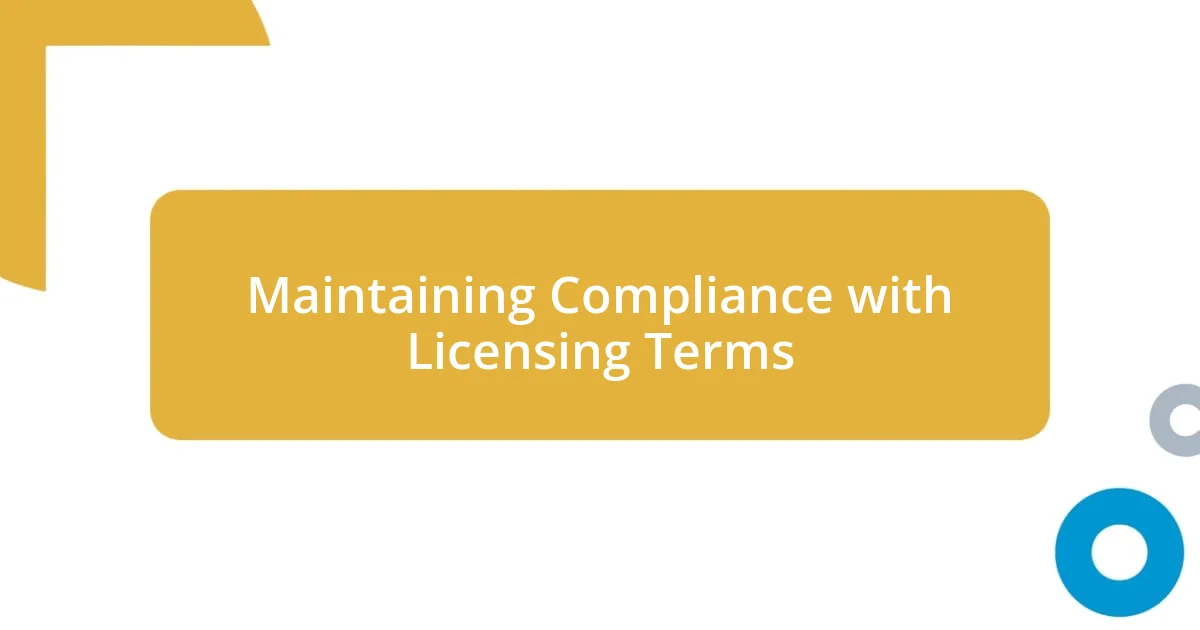
Maintaining Compliance with Licensing Terms
Maintaining compliance with licensing terms is something I’ve learned to prioritize deeply. I remember a time when I overlooked a minor detail in a licensing agreement, assuming it was inconsequential. That oversight led to a serious breach, resulting in not just financial loss but also tarnished relationships. It made me realize that details matter immensely. Have you ever had that “aha” moment when you understood the weight of seemingly small clauses?
One effective strategy I employ is creating a compliance checklist tailored specifically to each licensing agreement. This checklist doesn’t just serve as a reminder; it anchors me to my obligations. I once faced a challenge with renewal terms in an agreement that seemed straightforward. By revisiting my checklist, I caught a deadline that could have passed unnoticed. The relief of dodging that potential crisis was invaluable. Isn’t it comforting to have a proactive approach to avoid pitfalls?
Regular reviews of licensing terms also help me stay aligned with ever-changing industry standards. After a significant update to some regulations, I took the initiative to revisit all my agreements, which unveiled revisions needed for compliance. This practice not only keeps me secure but allows me to adapt to new challenges. Shouldn’t we all strive to be proactive rather than reactive when it comes to our professional responsibilities?
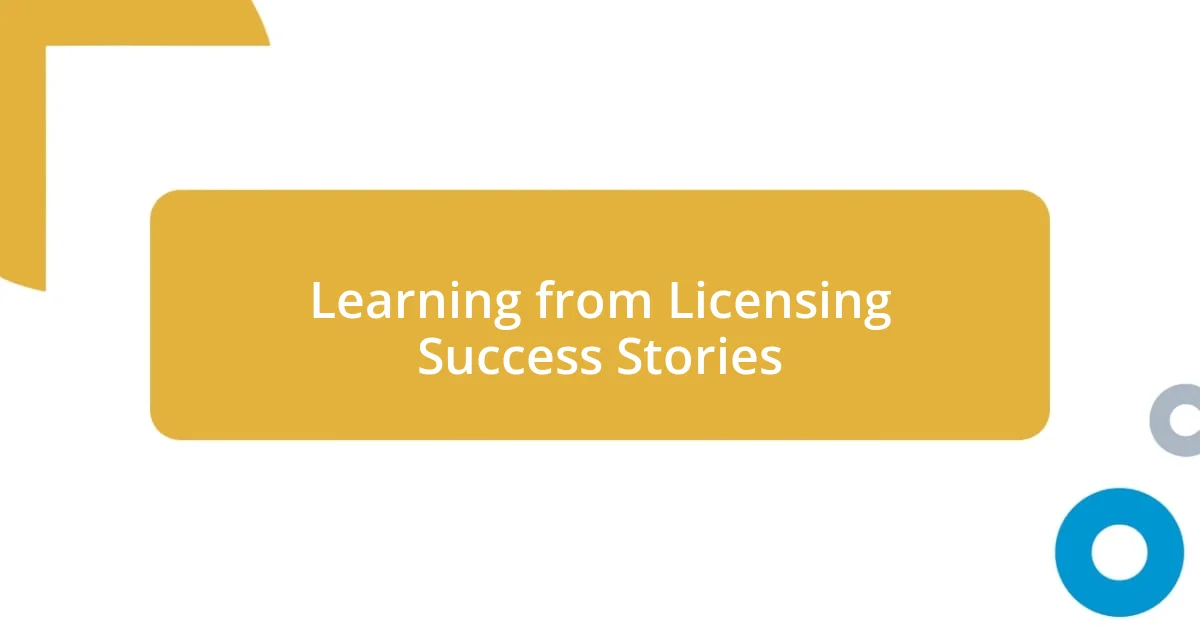
Learning from Licensing Success Stories
Learning from the successes of others in licensing can be a powerful game changer. I recall hearing about a colleague who meticulously documented her licensing journey, from initial negotiations to final executions. She shared her insights in a workshop, emphasizing how her careful preparations led to multiple lucrative partnerships. I left that session inspired and thinking, have I documented my own experiences thoroughly enough?
In one memorable success story, a friend faced a challenging licensing negotiation where the terms were complex and extensive. Instead of getting lost in the details, she leveraged feedback from her network. By seeking diverse perspectives before finalizing the agreement, she unearthed crucial insights that ultimately aligned the deal with her long-term goals. This experience taught me that collaboration and input from others can illuminate paths I’d never considered — have you ever tapped into your network to navigate tricky negotiations?
Success in licensing doesn’t just happen; it’s about learning and adapting. I vividly recall witnessing the growth of a startup after they adopted industry best practices from licensing successes. They embraced a mindset of continuous improvement, actively analyzing what worked in previous partnerships. This perspective not only propelled their business forward but transformed the team culture. Isn’t it fascinating how a commitment to learning can pave the way for sustainable success?


